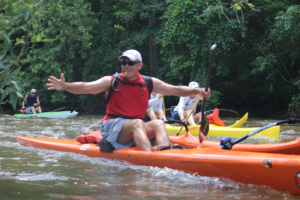“If it seems everyone in America is dragon boating, you may be right. But it all started in Philadelphia.”
That’s the start of my story in the Oct 4, 2017 Philadephia Inquirer.
Here’s the whole story
: If you haven’t seen an actual dragon boat by now, chances are you’ve heard of it. Or you’ve seen pictures. Or you have a friend on a team who posts their medals on their Facebook feed.
But what most people don’t know is that the ancient, Asian water competition, involving boats adorned with dragonheads, 10 pairs of paddlers, a steersperson and a drummer is exploding across the United States. Or that Philadelphia — where American dragon boating got its start — remains at the crest of the sport.
On Saturday, Oct. 7, more than 110 teams, and at least 3,000 paddlers, will take over the Schuylkill for the Philadelphia International Dragon Boat Festival, among the largest one-day dragon boat events in the United States.
At the same time, the country’s most elite dragon boat paddlers – Team USA– are training for the world championships starting Oct. 18 in Kunming, China, with Philadelphians heavily represented on the team and its coaching staff.
There are no national statistics on dragon boat participation, because many of the local festivals attract community groups or companies for short-term team building or charity drives. But places as far flung as Dexter, Ore., Minocqua, Wisc., and Norfalk, Va., are touting first, second or third annual dragon boat festivals. In July, the Cooper River held its second annual event, and Bucks County held its third on Sept. 23.
At the hundreds of festivals around the country, “people who never participated in a team sport because they’re not athletic suddenly experience the adrenalin of competition. It’s their little Olympic games,” said Mike Kerkmann, who runs Pan Am Dragon Boat, one of a half dozen firms that rent dragon boats to festivals.
Philadelphia is a hub for more serious teams, with practices up to five times a week and eyes on national and international meets. It boasts the oldest competitive team in the country, the Philadelphia Dragon Boat Association, as well as a police department team, a Penn alumni team, a couple breast cancer teams, a Chinatown team, a Fujinese team, a middle school team and the all-women’s Philadelphia Flying Phoenix, which has won national championships. Others have sprung up in the city’s suburbs. The Witches of East Greenwich, in Gloucester County, N.J., has grown from two teams in 2009 to nine teams today. Suburban Havertown now has 9 teams, 180 paddlers.

Lyudmila Kuznetsova of the Dragon Ladies
The Philadelphia festival, dating from 2002, is “huge,” said Bob Morro of Wallingford, secretary of the national and international dragon boat federations for 30 years. “We used to have senior boats to age 50. Now we’re pushing 80. There are also teen categories.”
Among those recently drawn into the sport is Lyudmila Kuznetsova, a Philadelphia dentist who first tried paddling in May with the Dragon Ladies, a Main Line team. After a handful of practices, the Dragon Ladies raked in a women’s division gold medal at Philadelphia’s Independence Dragon Boat Regatta in June.
“For me it was a chance to be on the water,” said Kuznetsova. She loves the exercise and the social aspects of being on a team that draws on newcomers to the region.
Its 25 members, ranging in age from 30 to 71, currently include several French women, a Chilean, a Belgian, two Russians, and its captain, Pauline Seeds, formerly of England. Three women are on a waitlist for next year. “I like the international group. It makes me look at the world in a very broad way,” said Kuznetsova.

Lynn Marks races with Against the Wind
Adding to the surge are survivors of breast cancer, among them Philadelphia attorney Lynn Marks.
“Sport is a life changer for most of us,” said Marks, who for 25 years headed Pennsylvanians for Modern Courts. After breast cancer in 1998 and a double mastectomy in 2006, she joined Against the Wind, the area’s first breast cancer team, founded in 2001. It will compete next July in Florence, Italy, in the International Breast Cancer dragon boat festival. Global interest is so great that registration closed a year before the event.
“It’s empowering to know after a life-threatening disease you can do something physical,” said Marks, adding that it’s also important socially, mentally and spiritually. “Physically because of the training, pushing ourselves to be as good as possible for racing. Socially, because we’re meeting new people. Mentally, it clears your head.” And she finds simply being on the Schuylkill River a spiritual experience.
Members practice five times a week in 40-foot long dragon boats and one or two-person outriggers. “We don’t talk a lot about having cancer,” she said. “We have in common that we know we could have a recurrence. When that’s diagnosed, we gather around them.”
American dragon boating began in Philadelphia in 1983 after the Hong Kong tourist bureau asked USRowing, to send a team, all-expenses-paid.
John Breen, then 23, was the youngest on the team, which was made up of a “who’s who” of rowing, he said. Among them was John B. Kelly Jr., the champion rower for whom Kelly Drive is named; Drexel University crew coach Joe Greipp; US Rowing official Ken Shaw Jr., then coach at LaSalle College High School; and Dietrich Rose, who had helped coach Philadelphia’s Vesper Boat Club’s eight to an Olympic gold medal in 1964.
“The short story is, they shipped a teak boat here from Asia, and we practiced every morning on Boathouse Row, and then we went to Hong Kong,” said Breen. Stunningly, after five days of racing, “it was China first, USA second.”
Breen, like others on that first team, never imagined that dragon boating would become so central to his life. Today he coaches Hope Afloat, another local breast cancer team and trains dragon boaters and other athletes at Cadence Fitness in Narberth.
Robert McNamara, a cash-strapped young doctor in 1984, joined the team for the free trip, he said. Two years later, he was coach of Team USA. Since then, it has won more than 100 world championship medals, including 23 golds. It also holds world records in the 500 meter: 1 minute, 48 seconds for men’s team, 1 minute, 53 seconds for coed team.
McNamara is on the Schuylkill several mornings a week by 5.30 a.m. before going to his job of 30 years, as chief of emergency medicine at Temple University’s Lewis Katz School of Medicine.

US Team coach Bob McNamara
Along the way, his four children and brother caught the bug. Daughter Colleen is a three-time world champion.
Philadelphia remains the “recognized perennial power house” in dragon boating, he said, because “it came out of the rowing community, with that work ethic, that culture of beating the other teams by working harder than them.”
As for its growing popularity across the country, McNamara says, “Anybody can get in a dragon boat and survive. It’s a big enough boat that balance isn’t an issue. You get on the water with a lot of other people and it’s a lot of fun.”
Dotty Brown is author of Boathouse Row, Waves of Change in the Birthplace of American Rowing.